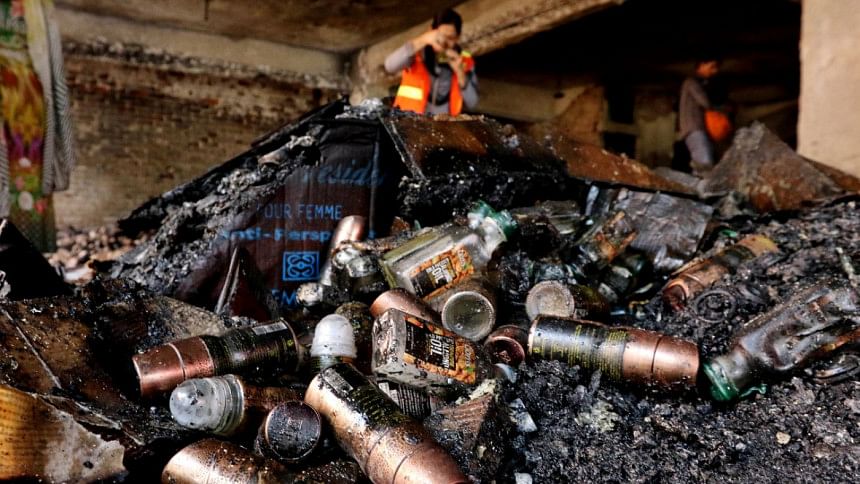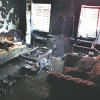Chawkbazar Fire: Confusing comments may compromise findings

According to a report published in this paper on February 24, an industries ministry probe committee has claimed that it found no evidence of a chemical factory or warehouse in the vicinity of the Chawkbazar fire. A member of the committee mentioned to this paper that the doctors had found no sign of chemical burns on patients. The full probe report is due at the end of this week. We find the initial remark confusing because the firefighters who were on the scene battling the deadly fire last Friday found several hundred barrels and sacks of combustible and flammable substances stored in the basement of the four-storey Hazi Wahed mansion, where the fire reportedly originated.
Despite all the media coverage and eyewitness accounts from the day, there appears to be an attempt to put the blame for the incident squarely on an exploding gas cylinder and not on the overwhelming presence of chemicals that are stored routinely in areas like Chawkbazar. Indeed, Shamsul Alam, chief inspector at the Department of Explosives, contradicted this theory. He stated on February 23 that "we have so far not found any sign of a blast of a cylinder." A fire service official has told us that an LPG cylinder blast within the confines of a residential building would result in shattered doors and windows and the collapse of parts of walls. "Such an explosion of a cylinder leaves marks of splinters on the walls," he said. "But nothing like that happened in the two restaurants." Our reporters on the ground visited a restaurant called Rajmahal and found three LPG cylinders intact.
We will, of course, know the details of the probe report if and when it is published. But the running commentary in the press backed up by fire-fighter accounts from the scene tells us that there were perfume bottles at the scene. The Old Town has been a vibrant centre for making both fake and original cosmetics and perfumery for decades. Chawkbazar is primarily a wholesale market for these products and also a place for raw materials to make plastic goods. That is why such huge quantities of raw materials for making these products are found in areas like Chawkbazar, and why firefighters had such a devil of a time in containing the fire in one location. It also explains why some of those involved in the chemical business have reportedly asked the press to report that the blast of a gas cylinder triggered the blaze. (The Daily Star, February 23)
While top lawmakers of the country have been publicly voicing what the rest of the country are feeling—that is, there has been gross negligence in upholding the law when it comes to storing chemicals in residential areas—we have a different narrative coming from the minister of industries. The minister claimed on the day of the incident that the cause of the fire at Chawkbazar's Hazi Wahed mansion had nothing to do with chemicals since the building did not have any chemicals stored there and the cause of the fire is from an LPG cylinder. (Prothom Alo, February 21) In effect, this implies that the whole issue of the presence of chemicals and inflammable materials in Chawkbazar does not exist. How exactly that conclusion was reached, even before the probe committee has published its findings, is of course a mystery. We are informed by the minister that what was found in the said mansion was not a warehouse for chemicals, but a warehouse full of material to make perfumes and cosmetics. Now, to the best of our knowledge, the commercial perfumery and cosmetics manufactured in the old quarter of the city are not made from vegetable or plant extract—they are made from chemicals! Everyone knows this. Of course, the minister may be privy to information which we are not, in which case it would be good if it was shared with us.
The Chawkbazar fire comes in the aftermath of another deadly fire nine years ago, in Nimtoli, which took the lives of some 124 people. The latest incident took place less than a kilometre away from Nimtoli and the similarities are uncanny. While some policymakers may be content on debating what caused the fire, the evidence points to the continued presence of chemical warehouses in these areas. Lives have been lost, families ripped apart and yet we continue to take no lessons from a very basic fact of life—residential areas cannot be used for storing flammable material and chemicals without experiencing tragedies like Nimtoli and Chawkbazar. Life may be cheap to the illegal hoarders of chemicals, but is it really?
The High Court in its directives after the Nimtoli incident in 2010 had given specific instructions: identify unauthorised buildings, warehouses and factories where chemicals and other flammable or petroleum products are stored. Had those directives been acted upon, we would not have had the Chawkbazar fire and loved ones of hundreds of families would not have had to suffer a gruesome death by fire. The people of the Old Town do not need monuments and a day of mourning. They need action and a commitment from the local authorities whose responsibility it is to keep neighbourhoods safe for living. Today, those responsible for illegally storing hazardous chemicals are facing public wrath, but unless those in the driving seat begin to treat the matter of public safety as a priority issue, where safeguarding people's lives are more important that profits—the Chawkbazar fire will just be another footnote in a growing list of "accidents" where people die by fire.
Syed Mansur Hashim is Assistant Editor, The Daily Star.










Comments